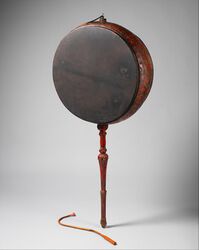Engineering:Lag-na
From HandWiki
Short description: Musical instrument
 Rnga or Lag-Rnga (exhibited at the MET[1]) | |
| Percussion instrument | |
|---|---|
| Other names | Na |
| Classification | Frame drum |
| Hornbostel–Sachs classification | 211.32 (Directly struck membranophone) |
A lag-na, or na, is an ancient Tibetan frame drum.[2] The drumhead has a minimum diameter of about one metre.[3] Like the dhyāngro (the principal drum of the jhakri shamans of Nepal), the lag-na has a carved, wooden handle.[4] One plays the na by striking its drumhead with a heavy percussion mallet.[3]
See also
- Damaru, a small, two-headed drum of Hindu and Tibetan Buddhist tradition
References
- ↑ Rnga or Lag-Rnga (18th century, Tibet), Metropolitan Museum of Art, Accession Number: 1997.365a, b, ObjectID: 504559, https://www.metmuseum.org/art/collection/search/504559, "Dimensions: Height: 55 1/8 in. (140 cm); Depth: 8 11/16 in. (22 cm); Diameter: 24 7/16 in. (62 cm) ... Classification: Membranophone-double-headed / frame drum"
- ↑ Robertson, Alec; Stevens, Denis (1960). The Pelican History of Music: Ancient Forms to Polyphony. Harmondworth: Penguin Books. p. 70. OCLC 220315541. https://archive.org/details/pelicanhistoryof002704mbp.
- ↑ 3.0 3.1 Blades, James (1992). Percussion Instruments and Their History (4th ed.). Westport: Bold Strummer. p. 149. ISBN 9780933224612. OCLC 28230162. https://archive.org/details/percussioninstru00jame/page/149.
- ↑ Arnold, Christopher. "Tibetan/Nepalese Shamanic Drums". Christopher Arnold. http://www.rhythmuseum.com/museum/shamanicdrums.html. Retrieved 6 January 2014.
 |

